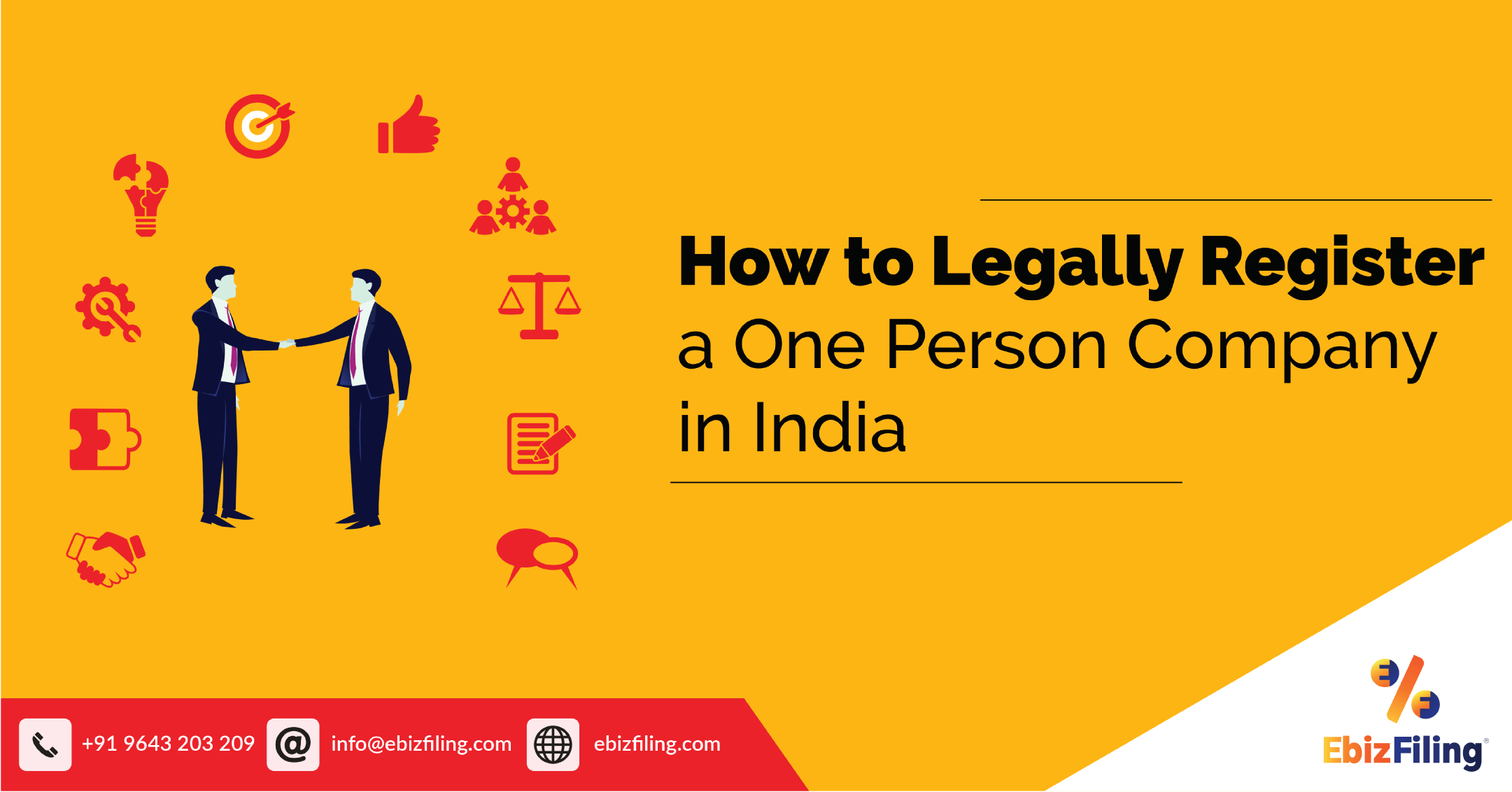Process of One Person Company Registration
Registering a One Person Company (OPC) in India is a fully online and structured process governed by the Companies Act, 2013 and regulated by the Ministry of Corporate Affairs (MCA). Below is a step-by-step guide explaining each stage in detail:
Step 1: Obtain Digital Signature Certificate (DSC)
The first step is to get a Digital Signature Certificate (DSC) for the proposed director. It is used to sign the company registration forms online. You can apply for a DSC through government-approved agencies like eMudhra or VSign. To get the DSC, you need to submit your PAN, Aadhar, photo, email ID, and phone number. This step is important because all company documents are filed digitally.
Step 2: Apply for Director Identification Number (DIN)
A Director Identification Number (DIN) uniquely identifies each company director. When a person becomes a director for the first time, the system automatically generates the DIN while they file the company incorporation form (SPICe+). They don’t need to file a separate form for it. This number allows the government to legally track all directors.
Step 3: Reserve Company Name using SPICe+ Part A
Choose a unique name for your OPC and get it approved by the Ministry of Corporate Affairs (MCA). Apply for name reservation using the SPICe+ Part A form. Ensure the name doesn’t match any existing company or trademark and ends with ‘(OPC) Private Limited’. Once the MCA approves it, the name will be reserved for 20 days, allowing you to proceed with the next steps.
Step 4: Prepare the Required Documents
Now, collect and prepare all the documents needed to register your OPC. This includes the Memorandum of Association (MoA) and Articles of Association (AoA), proof of office address, PAN and Aadhar of the director and nominee, and a signed consent form from the nominee (Form INC-3). You’ll also need to prepare declarations and consent to act as a director (Forms INC-9 and DIR-2). These documents are submitted with the registration forms.
Step 5: File SPICe+ Part B and Linked Forms (AGILE-PRO-S, MoA, AoA, INC-3, INC-9, DIR-2)
Once all documents are ready, fill and submit SPICe+ Part B, which includes company details like capital, office address, and director details. Along with it, file linked forms such as AGILE-PRO-S, MoA and AoA, nominee consent form (INC-3), and director declarations (INC-9 and DIR-2). All these are filed online on the MCA portal in one go.
Step 6: Pay Government Fees and Stamp Duty
After you submit the forms, you must pay the registration fees and stamp duty. The amount depends on your company’s authorized capital and the state of registration. You must make the payments online through the MCA portal. The system will process your application only after you pay the fee.
Step 7: Obtain Certificate of Incorporation (COI) from ROC
Once the Registrar of Companies (ROC) verifies your application and documents, you will receive a Certificate of Incorporation (COI). This certificate confirms that your OPC has been officially registered. Along with the COI, you’ll also get the Company Identification Number (CIN), PAN, and TAN. After this, your One Person Company is legally ready to operate.
What are the Benefits of One Person Company Registration?
- Limited Liability Protection: In an OPC, the sole director has limited liability to the company’s share capital. This means that if the company faces financial losses or legal issues, the director’s personal assets remain protected. This protection offers a safety net and encourages entrepreneurs to take risks without fearing personal loss.
- Easy to Incorporate and Manage: Registering an OPC is simpler compared to other types of companies, such as private limited companies. It requires only one person to start the business, making it perfect for entrepreneurs who want to run a business alone but still enjoy the benefits of a corporate structure. Additionally, it has fewer compliance requirements, making it easier to manage.
- Separate Legal Entity: People consider an OPC a separate legal entity from its owner. This means the company can own property, enter into contracts, and even sue or be sued in its own name, distinct from the director’s personal identity. This separation enhances the business’s credibility and trustworthiness.
- 100% Ownership: Unlike a private limited company, where multiple shareholders divide ownership, an OPC allows a single director to own 100% of the business. This structure gives the owner full control, enabling quicker decision-making and more streamlined operations.
- Tax Benefits and Financial Flexibility: OPCs enjoy the same tax benefits and exemptions as a private limited company. The tax rate for OPCs is also favorable. Additionally, it can take advantage of deductions and exemptions under various sections of the Income Tax Act, making it a cost-effective option for solo entrepreneurs.
- Easy Funding Opportunities: Though OPCs have limited shareholders, they can still raise funds through loans, venture capital, or even by issuing shares (with a nominee director). OPCs are eligible to raise funds from financial institutions and investors more easily than sole proprietorships.
- Perpetual Succession: Since an OPC is a separate legal entity, it enjoys perpetual succession, meaning the company continues to exist even if the sole director passes away or becomes incapacitated. The nominee director can take over the company in such cases, ensuring continuity and stability for the business.
- Credibility and Professional Image: Incorporating as an OPC gives the business a professional image and legal credibility. It helps build trust with clients, partners, and investors by presenting the company as a formal corporate entity rather than an informal sole proprietorship.
Conclusion
Registering a One Person Company (OPC) is an excellent choice for solo entrepreneurs who want the benefits of limited liability, separate legal entity, and complete control over their business. With the step-by-step registration process outlined above, starting your OPC in India is a simple and efficient way to establish a formal business structure. Whether you’re starting a small business or planning to scale up, an OPC provides the legal protection and flexibility needed to succeed. It’s a perfect option for individuals looking for a professional image, tax benefits, and the ability to raise funds
Suggested Read :
OPC Compliance After Incorporation
OPC Turnover Limit for Small Businesses
Benefits of One Person Company
Role of a Nominee In OPC
Form MGT 7A for OPC
FAQ











Reviews
Devang Panchal
09 Sep 2018They helped me with my company’s name change and I was quite satisfied with the way they served me. I am surely coming back to you in case of any compliance problem.
Gautam Chhabria
01 Oct 2019These guys deliver on their promise..
Animesh Garg
19 Nov 2021Highly professional team. Execution Manager Jayesh handled incorporation and post compliance of our foreign subsidiary to perfection in spite of lockdown hurdles. Anuja was our SPOC and they also provided full tax and accounting compliance retainer ship at reasonable charges. Highly recommend!
December 24, 2025 By Dhruvi D
Important Guidelines for OPC Incorporation in India with Ebizfiling Introduction At Ebizfiling, we aim to make your OPC incorporation journey smooth, transparent, and fully compliant with Indian laws. Being an aspiring entrepreneur venturing into a One Person Company, it’s important […]
September 22, 2025 By Dhruvi D
Minimalist Compliance Strategy for OPCs Introduction This Minimalist OPC Annual Compliance strategy focuses on fulfilling only the essential compliance requirements needed to run a One-Person Company efficiently. This approach reduces unnecessary burdens by prioritizing strategic tasks, using digital tools to […]
June 18, 2025 By Team Ebizfiling
Form DPT-3 Explained: Deadline, Applicability & Penalties Introduction Form DPT-3 is a yearly form that companies in India must submit to the government. It gives details about money the company has received, like loans or advances that are not considered […]